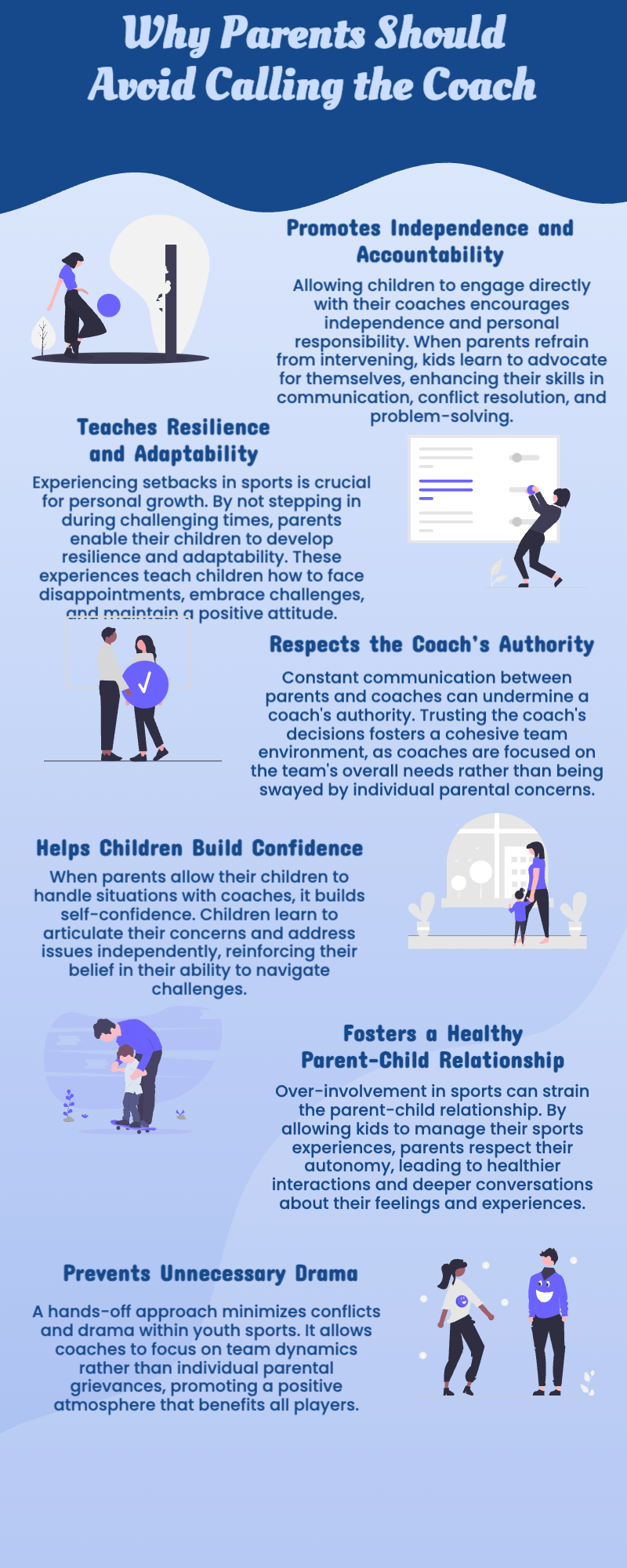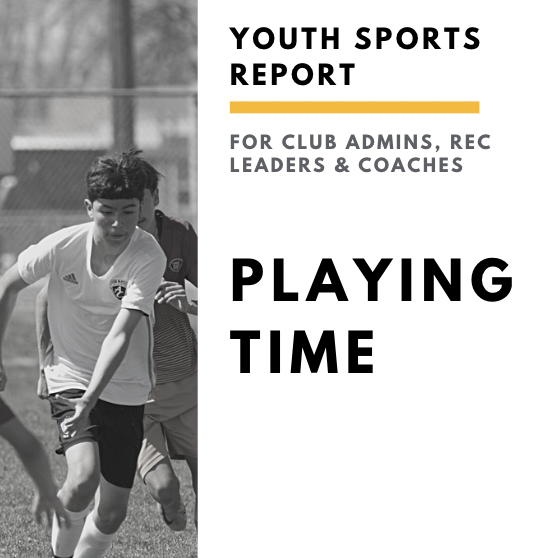Get our exclusive report. Download the iSport360 Club Switching Report Here – For Club Admins, Rec Leaders and Coaches.
Why Parents Should Avoid Calling the Coach
As a parent, it’s natural to want the best for your child, especially when they’re involved in youth sports. You might feel the urge to speak with the coach about your child’s playing time, performance, or concerns about the team. While it’s understandable to want to be involved, calling the coach to intervene can have unintended consequences. In fact, staying hands-off in certain situations allows your child to grow, develop resilience, and build important life skills. Here are several reasons why parents should avoid calling the coach and instead let their child take the lead.

1. Promotes Independence and Accountability
One of the greatest benefits of youth sports is the opportunity for children to develop independence and personal responsibility. When parents step in to solve their child’s problems, it makes it hard for kids to advocate for themselves.
By not calling the coach, parents give their children the space to handle situations on their own, fostering important life skills such as communication, conflict resolution, and problem-solving. These are abilities that will serve them well both in sports and throughout their lives. Encourage your child to have a conversation with their coach directly. It builds their confidence but also helps them take ownership of their athletic experience.
2. Teaches Resilience and Adaptability
Sports are full of ups and downs, and learning to handle disappointment is a key aspect of personal growth. Whether it’s being benched for a game, not making the starting lineup, or facing a tough loss, athletes inevitably encounter challenges. These moments, though difficult, teach resilience and adaptability—skills that are critical for success in life.
If parents step in every time their child faces adversity in sports, it sends the message that setbacks are something to be avoided or that someone else will always fix things for them. Instead, let your child work through their frustrations. They can work with the coach or their teammates on their own. It helps them learn how to bounce back from disappointments, embrace challenges, and keep a positive attitude even when things don’t go their way.
3. Respects the Coach’s Authority
Coaches are responsible for managing the team, setting strategies, and making decisions about playing time, lineups, and game tactics. When parents call or email coaches to intervene, it can undermine the coach’s authority and create tension. Coaches need to maintain respect and trust with all players and their families to build a cohesive team environment.
While parents may not always agree with every decision a coach makes, it’s important to remember that coaches see the bigger picture and make choices based on the team’s needs, not just individual players. Trusting the coach’s process allows them to do their job effectively without external pressures. If there are legitimate concerns, encourage your child to speak directly to the coach rather than stepping in as a parent.
4. Helps Children Build Confidence
When parents intervene on behalf of their children, even with the best intentions, it can inadvertently undermine their confidence. Children may start to feel like they aren’t capable of solving their own problems or navigating challenges on their own. This can lead to a sense of dependence on their parents to resolve issues for them.
By allowing children to handle difficult conversations with coaches and teammates, parents are sending the message that they believe in their child’s ability to advocate for themselves. This builds self-confidence, as children learn that they can communicate their concerns, ask questions, and work through tough situations without relying on their parents to step in.
5. Fosters a Healthy Parent-Child Relationship
Constantly getting involved in your child’s sports life can strain the parent-child relationship. Kids, especially as they get older, value their autonomy and want to feel in control of their own experiences. When parents are overly involved, it can create tension, resentment, or even embarrassment for the child.
By taking a step back and trusting the process, parents show respect for their child’s independence. This not only fosters a healthy relationship but also opens the door for more meaningful conversations. Instead of calling the coach, you can talk to your child about how they feel, offering support and guidance without taking over the situation.
6. Prevents Unnecessary Drama
In youth sports, there are bound to be moments of disagreement or frustration. Constant parent-coach communication can lead to unnecessary drama. When multiple parents start contacting the coach about their child’s playing time or personal issues, it can create an atmosphere of tension. It distracts the team from the main goal—helping kids grow, learn, and enjoy the sport.
Allowing coaches to manage the team without outside interference helps maintain a positive team dynamic. It also prevents the risk of favoritism or the perception that some players are receiving preferential treatment because their parents are overly involved. Keeping the lines of communication clear and professional ensures that the focus remains on the development of the athletes and the enjoyment of the sport.
Wrap Up
While it’s tempting to call the coach to discuss concerns or issues, taking a step back and letting your child navigate their own sports experience has far-reaching benefits. By promoting independence, building resilience, and respecting the coach’s authority, parents give their children the tools they need to grow both as athletes and individuals. Encourage your child to take the lead in their conversations with their coach, and remember that supporting from the sidelines—rather than intervening—can have a lasting, positive impact on their development.
iSport360 is the only app that does it all for youth sports. For more information on what we do, click here.
About the author:
Amy Masters is a sports mom, coach, and club administrator. She has been coaching youth sports for more than 10 years. She started Jr Lions Field Hockey, the youth recreation program for the Hunterdon County community growing it from 40 players in year 1 to 150 players by year 3. A few years later, she saw the love and competitiveness grow then started Omega Field Hockey Club serving NJ and PA players. Before coaching, she was a collegiate field hockey player for Lock Haven University. In her spare time (lol), she is head of marketing for iSport360 and the co-editor of the Youth Sports Survival Guide. The Youth Sports Survival Guide is the largest youth sports newsletter in the world.
Learn more or request a demo of our youth sports software that is helping teams improve communication, organization and player development.
September 19, 2024





